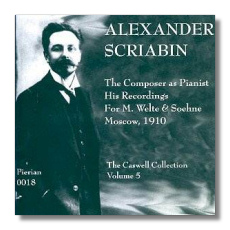
The Internet's Premier Classical Music Source
Related Links
- Scriabin Reviews
- Latest Reviews
- More Reviews
-
By Composer
-
Collections
DVD & Blu-ray
Books
Concert Reviews
Articles/Interviews
Software
Audio
Search Amazon
Recommended Links
Site News
 CD Review
CD Review
Alexander Scriabin

The Composer as Pianist
The Welte Mignon Piano Rolls
- Preludes, Op. 11 #1,2 1
- Poeme, Op. 32 #1 1
- Etude, Op. 8 #12 1
- Désir, Op. 57 #1 1
- Prelude, Op. 22 #1 1
- Mazurka, Op. 40 #2 1
- Preludes, Op. 11 #13,14 1
- Nocturne for the Left Hand, Op. 9 #2 2
- Sonate Fantasie, Op. 19 #2, 1st Movement 3
- Mazurka, Op. 40 #2 4
- Preludes, Op. 11 #3-6 5
- Album Leaf, Op. 45 #1 5
- Etude, Op. 2 #1 5
- Desir, Op. 57 #1 6
- Kresse dansée, Op. 57 #2 6
- Enigme, Op. 52 #2 6
- Poeme, Op. 32 #1 6
- Nocturne for the Left Hand, Op. 9 #2 7
1 Alexander Scriabin, piano (rec. Moscow 1910)
2 Josef Lhévinne, piano (rec. Freiburg 1906)
3 Constantine Igumnoff, piano (rec. Moscow 1910)
4 Alexander Goldenweiser, piano (rec. Moscow 1910)
5 Austin Conradi, piano (rec. New York 1921-22)
6 Leff Pouishnoff, piano (rec. New York 1926)
7 Magdeleine Brard, piano (rec. New York 1925)
Pierian 18 50:33
This disc has surprised and delighted me. I confess that these piano pieces are new to my ears and that I have never before been inclined to listen to recorded piano roll sound, never having been pleased with the player pianos I have heard. For what it is worth, I find the music here quite pleasurable and the sound astounding.
Let me address the sound first, as that is what most startled me. These performances date from nearly a century ago, in the case of Scriabin's, and from the 1920's in the case of several other distinguished performers, but these are not "historic recordings, in the sense that they were made with old recording equipment. Instead, they were made with modern equipment in true stereo sound. For those not familiar with the Welte Mignon Piano Rolls (between 1904 and 1934), as I was not, these captured not only all the notes the performer played, and the duration of each note, but the exact tempos and especially the dynamic level of each note, as well as the pedaling, even a "satisfactory illusion of half-pedaling. In other piano-roll technologies, Ampico and Duo-Art, dynamics were added by engineers. The present recording was made by Kenneth K. Caswell on a restored 1923 Feurich Welte piano. A blindfold test would, I am certain, be able to fool very many listeners. At any rate I find the sound on this disc more than satisfying.
Don Satz, in a very favorable review of this release, has some small reservations about the sound, saying that "it tends to smooth-out the musical edges and contours, compared to a Russian Season historical recording." Not having heard that disc, I am sticking my neck out, but my experience of very old piano recordings is that they sound very staccato to me.
In his 1981 book, Facing the Music, in an excerpt reprinted in the notes of this CD release, Harold C. Schonberg wrote that Scriabin was out of favor to the extent that resentment was a typical reaction to performances of his music. At the present time there are 270 CDs containing some of his piano music, so a generation's passing would appear to have changed that.
Scriabin's piano music has often been compared to that of Chopin and Liszt. Schonberg calls it sensuous, with melodic gestures characteristic of Scriabin. Baker's Biographical Dictionary of Musicians, ed. Slonimsky, says that Sciabin's "solitary genius had no predecessors and left no disciples; that his style evolved toward extreme chromaticism; and that in his piano piece Desir, Op. 57 (included here) "the threshold of polytonalty and atonality is reached. To my ears, these pieces tend to be surprisingly quiet and gentle, especially in Scriabin's own performances.
Four of the pieces on this disc are presented with two different performances, and I found these differences interesting. The Nocturne for the Left Hand, Op. 9, #2., recorded in 1906 by Josef Lhevinne includes a section played loudly for dramatic effect, which I find intrusive and even jarring . In contrast, Magdeleine Brard, a brilliant student of Cortot, demonstrated strong playing and full sound but takes the piece more broadly, with relaxed tempo and open phrasing; the effect is much more appropriate to a work designated as a nocturne. (Her timing is 38 seconds longer in this piece.)
In the Poeme, Op. 32, #1, there is no great difference in timing between Scriabin's playing and that of Leff Pouishnoff but Scriabin's 1910 performance is more even in phrasing and dynamics than the 1926 performance of the other pianist, who varies both dynamics and phrasing so that it sounds more romantic in style.
In Desir, Op. 57, no 1. there is a contrast in the performances of the same two pianists. Pouishnoff supplies emphatic rippling arpeggios, which are heard simply as strong accents in Scriabin's limpid performance.
In the brief Mazurka, Op. 40, #2, Scriabin takes the opening a bit faster than Alexander Goldenweiser, but Scriabin's retards give a poignant effect, and his crisp final note, different from the printed score, is refreshing. Goldenweiser, like Lhevinne, shifts to a more forceful dynamic in the middle, unnecessarily.
Other pieces on this disc include nine preludes, played by Scriabin or Austin Conradi, a couple of etudes, a movement from Sonate fantasie, Enigme, Op. 32, #1, Album leaf, Op. 45, #1, and Knesse Dansee, Op. 57, #2.
Copyright © 2008, R. James Tobin




















